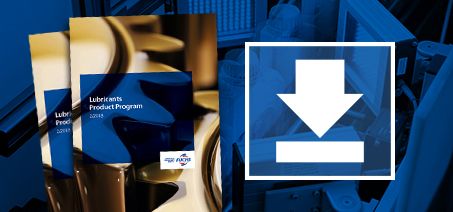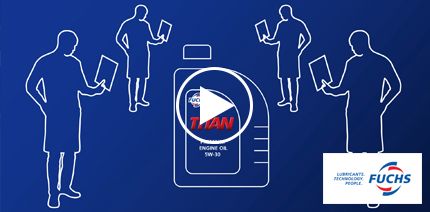Automotive Service Fluids
FUCHS offers a full range of automotive Service Fluids for every vehicle, which you can find in our Product Finder below.
There are 6 key fluids that are indispensable for vehicles in order for them to run effectively. Letting proper maintenance slip can be a costly mistake that could result in irrepairable damage to parts of the vehicle.
What are the 6 essential service fluids that vehicles need?
The requirements for an antifreeze is enormously high, because on average, about 150 litres of coolant per minute are pumped through the cooling circuit of an average car. One third of the heat of combustion is released from the coolant to the atmosphere. The coolant passes over 100 different materials and must be compatible with all of them.
Tasks & requirements of modern antifreeze:
Antifreeze
Reliable prevention of liquids freezing, even at extremely low temperatures.
Protection from soiling/deposits
To keep the entire cooling circuit working properly in the long term, coolant must keep any soiling/deposits to a minimum.
Protection from overheating
For example, if sufficient heat dissipation is no longer guaranteed due to soiling deposits.
Protection from aging and oxidation
The protective effect of the coolant must remain intact throughout the entire duration of the respective service interval.
Corrosion protection
To reliably eliminate the risk of damage to any metallic materials in the cooling circuit, such as cast iron, cast aluminium, steel and brass.
Without proper coolant, the cooling system provides ideal conditions for corrosion thanks to its high temperatures and large volume of water. Deep rust spots/pitting can occur in the metal, potentially causing the coolant pump or the entire cooling system to fail. This can ultimately lead to extremely costly engine damage.
Engine oil (also referred to as motor oil) is a vital part of any engine. It is responsible for ensuring optimal protection of components from wear, excess heat, corrosion and more - all while enabling high performance of the engine.
Lubrication
The main role of motor oil is to lubricate the components in the engine system which are subjected to constant friction when in operation.
Cooling
The heat created by operational friction as well as hear from combustion is trapped, transferred and released through the lubrication circuit. This works in tandem with coolant, reaching the areas of the engine that the coolant cannot.
Cleaning
When an engine is running, the engine oil collects the deposits created by dust and combustion residue, preventing it from clogging the engine and impacting performance.
Corrosion protection
The additives within engine oils help to neutralise the corrosive acids created by fuel combustion, which would otherwise damage metal engine components. These corrosion inhibitors can deteriorate over time, meaning that engine oil should be changed regularly.
Read more on engine oils from FUCHS.
Brake fluids are special hydraulic fluids used to transfer the pedal force to the wheel brake cylinder during braking. The demands on these important fluids are high:
High boiling point
This ensures safety even in extreme conditions such as extremely high temperatures.
Minimal drop in boiling point through water absorption
Throughout its life, brake fluid will absorb water which subsequently lowers its boiling point. A good brake fluid should retain as high a wet boiling point as possible through water absoprtion.
Optimal corrosion protection of the system
Brake fluids contain corrosion inhibitors as part of the additive package added at manufacturer level.
Comprehensive compatibility with all brake system materials
Brake fluid comes into contact with numerous components within the braking system which are made up of various materials such as plastics, rubber and metals. The fluid must be compatible with all of these materials whilst also performing optimally.
Always have your brake fluid checked every 2 years and replaced as necessary.
If you notice brake delay, the first thing to check is the brake fluid.
Transmission fluid plays a crucial part in the smooth running of your vehicle, ensuring the effective lubrication of transmission components. There are two categories of transmission fluid - automatic and manual - each suited to their corresponding engine types. Manual transmission fluid can also be referred to as gearbox oil.
With the correct fluid, gearbox efficiency can be improved, subsequently reducing fuel consumption.
Tasks & requirements of automatic transmission fluids:
Low viscosity
Gears within an automatic transmission tend to be much smaller than those in a manual transmission. To combat this, automatic transmission fluids are kept at a low viscosity (generally around 0W-5 or 5W-10). This means that they can flow freely, transmitting power from the engine to the transmission effectively.
Maintenance of channels between components
Detergent is added to transmission fluid to avoid any debris build-up which could have adverse effects on operation.
Heat resistance
Automatic transmission fluid also acts as a coolant, directing heat away from working parts created by friction.
Anti-foaming
Anti-foaming properties of the lubricant prevent any air making its way into the lubricant. This ensures that there is no interference of the force being transferred.
Tasks & requirements of manual transmission fluids:
High viscosity
Gearbox oil is much thicker than automatic transmission fluid, with the average viscosity being around 75/90. This protects the components from operational damage, whilst simultaneously delivering a smooth transition between gears.
Heat resistance
The amount of heat created by shifting gears means that manual transmission fluid must be able to transfer heat away from the gearbox to avoid any adverse effect on operation.
Operational under extreme pressure
Transmission fluids from FUCHS contain specially formulated additives that allow them to operate consistently under extreme pressure.
Find further technical information on Gear Oils from FUCHS.
Power steering fluid plays a crucial role in ensuring that even the smallest movements from your steering wheel translate to the wheels of the car. This hydraulic fluid creates a link between the steering wheel and front wheels, decreasing the amount of effort it takes to turn the vehicle. Additionally, power steering fluid ensures that the hoses, pistons, valves and power steering pump work optimally.
Regular servicing of power steering fluid can help prolong components in the system - neglecting to flush and replace the fluid can lead to costly damage.
Whilst windscreen washer fluid (or screen wash) may get overlooked on this list, it is imperative for safe driving.
As well as keeping your windscreen free from dirt, insects and traffic film, screen wash can also have anti-freeze properties which can prove to be invaluable in the winter months. A screenwash that promotes smoother wiper action can also help to maintain the wipers, prolonging their life.
How to find the right lubricant for your vehicle
Get an overview of our wide range of automotive lubricants for passenger cars and commercial vehicles in our Product Finder.
With the Oil Chooser from FUCHS you reach step by step the optimum lubricant for your vehicle.
Looking for further lubricants? Please use our Product Assistant.



